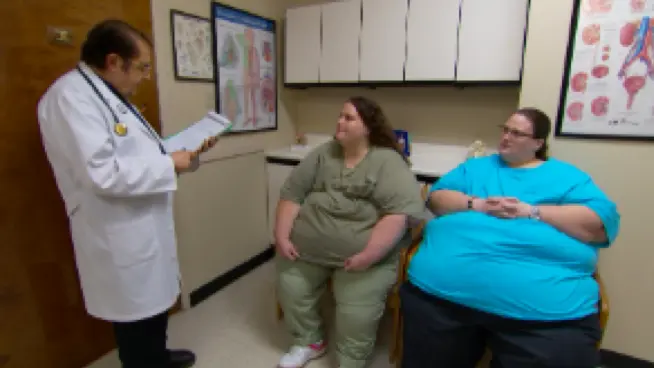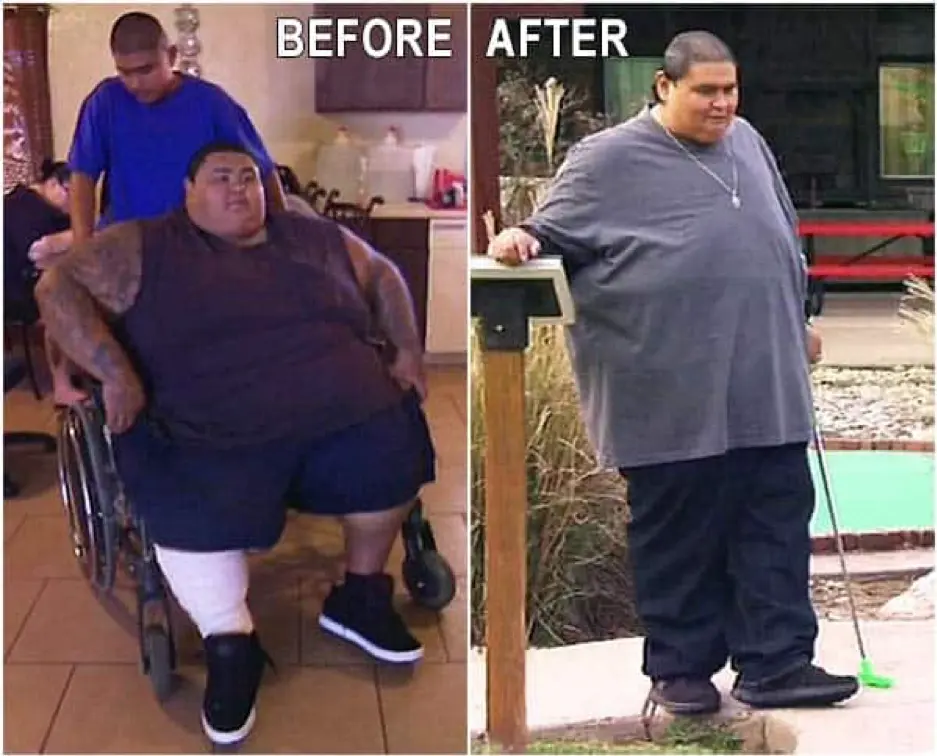Some of the links in this post are affiliate links. This means if you click on the link and purchase the item, we will receive an affiliate commission from the vendor at no extra cost to you. These business relationships allow us to keep bringing you great EatMoveHack content. All opinions remain our own.
Who is Dr. Now
Dr. Nowzaradan (Dr. Now) is a bariatric weight loss surgeon based in Houston, Texas who achieved notoriety during his stint on the popular TLC show My 600-Lb Life. This show follows the stories of morbidly obese individuals who are seeking bariatric surgery in order to lose weight. His show has sparked great interest in Dr. Nowzaradan’s diet. This post is here to help shed some light on whether Dr. Nowzaradan’s 1,200 Calorie Diet is right for you.
Weight loss surgery is a helpful tool to help severely obese individuals lose a portion of their excess fat. The operation, depending on which type of bariatric surgery is chosen, limits the stomach size so an individual cannot physically eat the same number of calories that they were able to eat prior to the surgery.
Not without risk
These surgical procedures are becoming safer and safer with the advent of new technologies. However, as with all surgical procedures, there is always risk. These range from the immediate risks generally associated with any surgical procedure (anesthesia complications, bleeding problems, blood clots resulting from surgery, etc.) to more ongoing risks that are particular to this type of procedure (acid reflux, chronic nausea or vomiting, inability to eat certain foods, etc.). Therefore, these types of surgery, while relatively safe, should only be considered after other viable options for weight loss have been exhausted.

The Surgery
On My 600-Lb Life, Dr. Nowzaradan typically performs gastric bypass surgery. This involves creating a small stomach pouch that empties directly into the small intestine, so that food bypasses the stomach and the first part of the small intestine so that fewer calories are absorbed[1].
However, in order to go through with bariatric surgery, a patient has to lose weight first, which is where Dr. Nowzaradan’s infamous 1,200 calorie diet came from (you can learn more about the structure of his diet here). Losing weight prior to surgery makes the operation safer, helps the individual recover faster, and makes it more likely that the weight will continue decreasing post-surgery.
Why patients lose weight pre-surgery
Your liver is located just to the left of your stomach. For most “healthy” people the liver could be easily moved out of the way for a surgical procedure on a stomach. However, for the obese patients that are candidates for this surgery, the liver is generally suffering from “non-alcoholic fatty liver” syndrome. This creates an engorged liver that is more difficult to operate around. So, one of the main goals of this diet is to reduce the size of the liver. As an ancillary benefit, often the abdominal fat is also reduced, starting the patients on their way to their weight loss journey.
These diets are usually implemented within 2-3 weeks prior to the surgery, but they can be used for longer durations if significant liver shrinking is required. However, these are not considered “permanent” diets as the level of calorie restriction is significant and often unsustainable for most people.

Dr. Nowzaradan explaining the 1,200 calorie diet to his patient. Source: YouTube
The diet
The 1,200 calorie diet plan is focused on the consumption of high levels of lean protein, vegetables and severely reduced consumption of carbohydrates (especially refined carbohydrates – think sugar, white bread, cookies, chips, etc. – basically anything in a bag or a box). This type of diet helps to encourage a reduction in liver size, thereby making surgery complications less likely, as well as helping to prime the body and mind to consume less of the highly addictive and palatable refined carbohydrates and sugar.

Dr. Nowzaradan’s patient Michael Dominguez, from 635 lbs (left) to 300 lbs (right). Source: Daily Mail
Dr. Nowzaradan doesn’t prescribe the exact same diet plan to every patient, as it is based on the patient’s weight, height, age, gender, and how much weight they need to lose prior to surgery. That being said, he typically recommends a diet ranging from 800 to 1,200 calories per day all based around the same dietary concepts.
An 800-calorie diet can look like a lot of things, I can look like one McDonald’s Quarter Pounder with Cheese (780 calories) or it can look like 10 medium-sized eggs (780 calories). The density of the caloric level of foods is often determined by the level of processing. Heavy processing leads to heavily caloric foods. For example, one cup of raw spinach consists of 7 calories.

Dr. Nowzaradan’s patient Amber Rachdi, from 660 lbs (left) to 236 lbs (right). Source: Celebrity Health Critic
So how does the diet work?
First, the diet is highly restrictive. If you are trying to lose weight without bariatric surgery, it is better to be on a less restrictive diet that allows you to eat enough food so you aren’t left hungry, which will make you more likely to stick to the diet plan. Severe calorie restriction has a variety of unpleasant side effects which make it difficult for long-term compliance.
However, as these patients are only doing this for a short amount of time, the aim is to lose as much weight as possible so the best way to do this is to seriously reduce your caloric intake. Most of these patients are eating around 10,000 calories per day normally. So, under this diet, they are cutting their calories by 90%. This is why they are able to see such dramatic weight loss in such a short period of time. For an average person, this would equate to reducing your daily calorie consumption into the range of a few hundred calories per day.
The diet focuses on maintaining a good amount of lean protein. This is because the patients want to maintain as much muscle mass as they can during the diet and the accompanying recovery period. So it’s essential for them to continue to consume high-quality protein. Luckily, protein has a high level of satiety, which will lead to fewer hunger pains during the diet period.

Dr. Nowzaradan also tells his patients to get the main bulk of their calories from non-starchy vegetables, this is because these are satiating and nutrient-dense but are very low calorie (as discussed above, a cup of spinach has 7 calories but it is packed full of powerful vitamins and nutrients). Some other examples include zucchini, cauliflower, asparagus, kale, beets, and onions.
Impact on the liver
Because the primary focus of the diet is upon the liver, let’s talk a bit about how it works in reducing the liver size. A fatty liver is the result of excess glycogen (basically sugar) stores within the liver. The patients have consumed more “sugar” (whether through pure sugar, fruit sugar, or carbohydrates) than their body can use. The liver is a primary place where such excess glycogen can be stored. Resulting in a fatty or oversized liver.
Dr. Nowzaradan’s diet program that is used dramatically reduces the incoming levels of new glycogen into the system. This requires the liver to release the stored glycogen back into the body for use as fuel. This will result in the reduction of glycogen, water, and fat stores in the liver. This will allow the liver to be more easily maneuvered during the procedure.
Dr. Nowzaradan’s 1,200 Calorie Diet is highly effective for his patients because he helps them to dramatically restrict their caloric intake while also working to increase their macronutrient consumption. This helps guide their body towards weight loss and appetite suppression. It also is a process of education for most of the patients. They need to re-learn how to eat foods that are fueling their body in the right way. This is because, after the surgery, they are not going to be able to consume as many calories, and therefore it is important that the calories they do consume are packed full of vitamins and nutrients.
Conclusion
Dr. Nowzaradan’s 1,200 Calorie Diet is not right for most people. The diet doesn’t look to have been designed to be sustained for a long period of time. Most people would call a “crash-diet”. As an intentional and managed “crash-diet,” it is designed to allow maximum liver reduction and weight loss in the window before surgery. So, before considering adopting this diet please read more about diet and nutrition, and carefully consult with your doctor to see if this is a journey you need or can travel safely.
Want to read about more diet and fitness programs? Check out these great articles!
- What Happens After Weight Loss Surgery
- My Favorite Amazon Finds for a Low-Carb Kitchen!
- How I Lost 65 Pounds in 1 Year
- David’s Low Carb & Intermittent Fasting Weight Loss Plan
- Tim Ferriss’ Fasting Technique – 3 Day Protocol
- David Goggins’ Complete Diet and Workout
- Chorizo Turnip Soup
- Egg-Free Keto Breakfast Recipes – 8 Best
[1] https://www.webmd.com/diet/obesity/weight-loss-what-happens-during-bariatric-surgery

